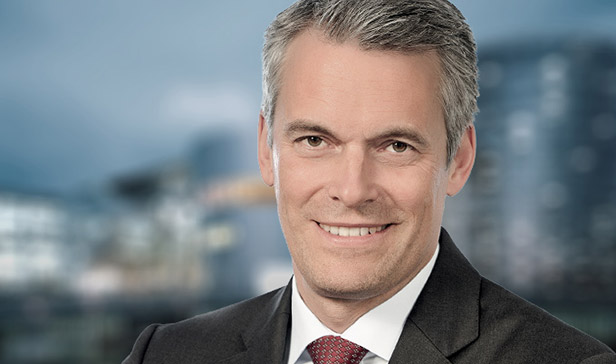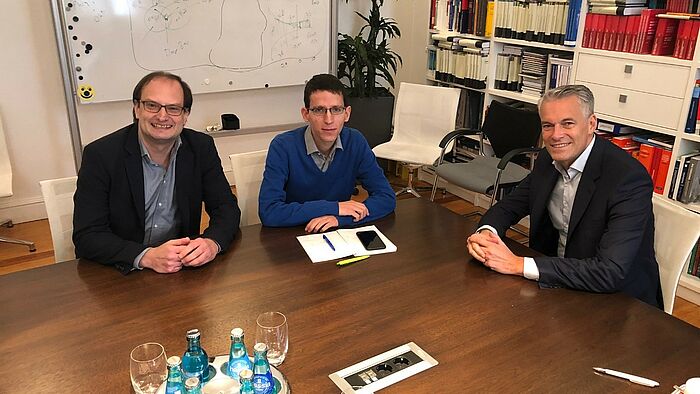Jochen Keysberg expects FM service providers to take on additional tasks in future in the context of digitalization.
Source: Immobilien Zeitung, author: Florian Hartmüller
The FM specialist Apleona is increasingly integrating more services into its range. CEO Jochen Keysberg reports strong interest from customers. Digitalization and political ESG requirements are contributing significantly to this development. To meet the demand, more staff are required. The fast-growing company is finding these employees abroad, too.
A shortage of skilled workers, digitalization, decarbonization: Several trends at once are speeding up the bundling of facility management at major service providers, says Jochen Keysberg, CEO of Apleona. Integrated facility management (IFM) with “output-oriented contracts” plays an important role here. Such contracts now account for 25% of Apleona’s total volume. “This is an extremely high ratio that is growing faster than average,” says Keysberg, referring to both Apleona and the market. “More and more customers are deciding to do this increased outsourcing.”
In addition to savings and transparency, IFM gives customers the opportunity to respond quickly to developments. This is because it enables a strategy to be implemented throughout the portfolio in a short time without having to talk to a large number of different service providers. “In the crisis, people can focus on their core processes,” says Keysberg, describing the benefit. When it comes to IFM, he says, it is important for service providers to work across national borders and different types of services. “A customer that gives you a contract like this wants to get everything from a single source and often thinks in terms of divisions of its own group rather than in regions.” A “clear key account structure” is needed. Apleona has recently seen growing success with IFM with non-German customers. “We always seek to perform a relatively high proportion of services ourselves, whether in Germany or abroad,” says Keysberg. In hard services, Apleona aims for a figure of around 80% here. For major IFM contracts, however, this target is generally to be achieved only after two years, as it is often necessary to find the staff for these extensive mandates first.
In view of the shortage of skilled workers, Apleona has increasingly focused on recruitment in non-EU counties since last year. 70 employees were thus brought to Germany in 2022, with a rising trend. The “target range” for 2023 is between 100 and 200 people. These will be technical employees, i.e. electricians, electrical engineers, and project managers. Promising countries for recruitment include Turkey, Iran, Egypt, and India. “This will not solve the shortage of skilled workers by itself, but it is an additional module,” explains Keysberg. To take on the new employees in Germany, clear structures and experience in dealing with public authorities are needed. Apleona therefore has special “welcome managers.” “We want to have people who want to integrate and work here on a long-term basis.” There was no net increase in staff from Ukraine last year. Instead, some employees headed there to support the country during the war. Apleona also aims to counter the shortage of skilled workers by professionalizing the recruitment process. “There are very clear responsibilities and very clear time limits for how long an application can be left lying around,” says the CEO. Companies that act too slowly here will lose a lot of good applicants, he says.
In general, professionalizing processes is an important topic for Keysberg. Apleona has been working on this “extremely intensively” for four or five years. For a sector that has grown substantially over the past 20 years and has “decentralized origins,” this is “not a natural given.” Additional efficiency is to be created by way of the four steps “standardize, optimize, digitalize, automate.” “In my view, this is the only way to be able to grow sustainably.” Optimizing operational processes is about having clearly specified maintenance times for certain parts of the building technology, for example. The relevant information is recorded digitally, meaning that the necessary replacement parts can be given to the assigned employee immediately and the employee has the right forms ready on a tablet. In view of the shortage of staff, it is also important to “deploy people in line with their training and skills.”
In addition, modular products that can be used for different types of properties, but that Apleona can also implement with the existing staff, play a key role. “It doesn’t help me if I make specialized products but there are only ten people at our company who can implement them. We have many technicians on site, but not all of them are able to control complex heating systems, let alone upgrade them.” With hydraulic balancing, for example, it is necessary to “find sensible simplifications” with which a large part of the effect can nonetheless be achieved. For example, balancing can be carried out by building section rather than by room. “It is better if I get 100% of my portfolio to 80% than if I get 10% of it to 100%.”
With regard to decarbonization, Keysberg thinks that the increase in energy prices as a result of the Ukraine war has had more of an impact on institutional FM customers than regulation. “We are seeing enormously high demand for transparency services and simple measures to reduce CO2.” He does not expect major construction measures involving high investments to be implemented to a significant extent in the next two to three years. However, Keysberg anticipates that resources will be “extremely scarce” then. Facility managers that already operate in the properties and know them well would therefore take on additional tasks.
When it comes to transparency with digital tools, customers’ requirements are increasing “daily,” according to Keysberg. Apleona meets these with its own internally developed digital platform, in which various solutions can be integrated. This is now in use at the 200 biggest customers. There are already more than 5,000 users on the associated app, and the numbers are rising “almost exponentially.” According to Keysberg, it is difficult to sell an individual application. He therefore thinks that the facility manager should in future act as the “integrator” for all digital solutions in a building. A wide range of information could then be called up on a dashboard. For example, “real-time reporting” shows directly whether an order has been placed too late by the customer or performed too late by the service provider.
This will change the relationship between asset, property, and facility managers, predicts Keysberg. Particularly when it comes to ESG, the current division of responsibilities based on different areas of expertise and possibly interests is not helpful, he says. “Decarbonization and digitalization will play a part in bringing an end at some point to the governance model in the form it exists in today.”
Apleona as a whole is also changing and steadily growing. Organic growth of the overall group has recently been at “well over 10%,” reports Keysberg. “We expect to grow at a similar rate next year.” In addition to IFM, regional business in Germany still plays an important role. Major contracts from the logistics sector, for example with Mileway and Prologis, contribute to this. Partly because it is possible to grow along with the customers, Keysberg calls this “a very rewarding sector.” Last year, Apleona also acquired companies in Austria, Poland, the United Kingdom, and Ireland. The strategy of targeted purchases is to be continued. Internationally, this will only involve companies that perform hard services and integrated FM services. Keysberg would like to make Apleona the market leader “in one European country or another.” And there is potential in Germany, too: “The fact that we have not yet purchased a company in Germany doesn’t mean that we don’t have anything in the pipeline there yet.”
Florian Hartmüller and Lars Wiederhold


